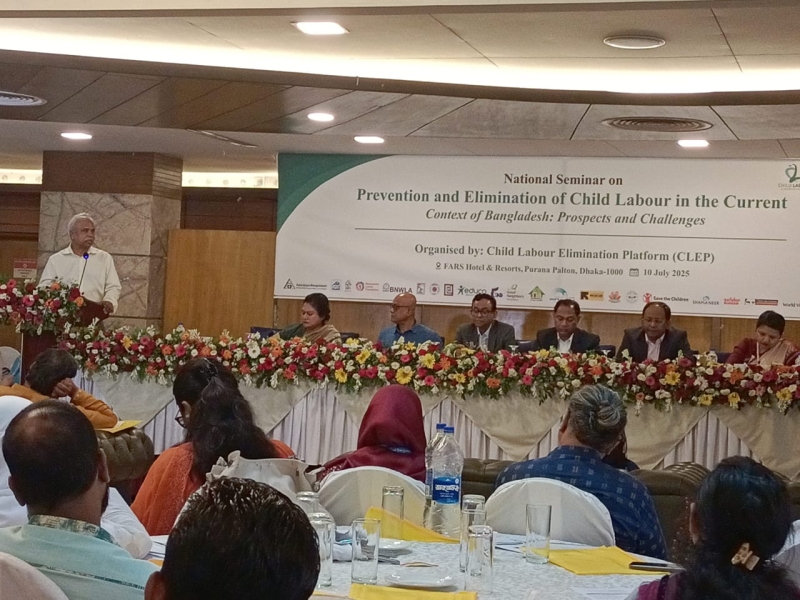- India Sees 9% Drop in Foreign Tourists as Bangladesh Visits Plunge |
- Dhaka Urges Restraint in Pakistan-Afghan War |
- Guterres Urges Action on Safe Migration Pact |
- OpenAI Raises $110B in Amazon-Led Funding |
- Puppet show enchants Children as Boi Mela comes alive on day 2 |
Child labour rising, over 1060,000 in hazardous jobs

Despite taking different national and international efforts to curb child labour in Bangladesh, the number of working children continues to rise. Currently, there are approximately 3.5 million working children in the country, of whom more than 1060,000 are engaged in hazardous occupations.
This alarming information was presented by Dr Mohammad Nazmuzzaman Bhuiyan, a law professor at the University of Dhaka, during a national seminar titled “Prevention and Elimination of Child Labour in the Current Context: Prospects and Challenges”, held on Thursday at a local hotel in the capital.
The seminar was organised by the Child Labour Elimination Platform (CLEP), a coalition of 21 national and international development organisations.
According to Dr Bhuiyan’s presentation, the rate of hazardous child labour has declined—from 3.2% in 2013 to 2.7% in 2022. However, the overall rate of child labour has slightly increased during the same period, rising from 4.3% to 4.4%. This suggests that although fewer children are involved in dangerous jobs, the broader issue of child labour remains largely unresolved.
He pointed out that, despite clear prohibitions in the country's labour laws against employing children in hazardous work, many children are still engaged in risky and exploitative conditions outside legal protections. This indicates gaps in monitoring and enforcement, particularly in the informal sector.
Abdul Hamid, Country Director of Educo Bangladesh, presided over the seminar. Labour Secretary AHM Safiquzzaman, Head of the Labour Reform Commission Syed Sultan Uddin Ahmed, Additional Secretary Saidul Islam, Inspector Dr Bishwajit Roy from the Department of Inspection for Factories and Establishments, Child Labour Monitoring Council Co-Chair Advocate Salma Ali, ILO Senior Programme Officer Syeda Munira Sultana, Debate for Democracy Chairman Hasan Ahmed Chowdhury Kiron, Professor AHM Kishwar Hossain, child labour expert Naeemul Ahsan Jewel, Shapla Neer Country Director Tomoko Uchiyama, and Educo Bangladesh Manager Afzal Kabir Khan, among others took part in the discussion.
In his remarks, Labour Secretary Safiquzzaman said the government is actively working to reduce child labour and expressed hope that necessary amendments to the labour law could be finalised within the next two months. He also noted that Bangladesh has already ratified eight conventions of the International Labour Organization (ILO) related to child labour and is preparing to ratify the remaining two. The government will also examine how much is being spent by public and private agencies on child labour prevention initiatives, to ensure better coordination and accountability.
Syed Sultan Uddin Ahmed emphasised that child labour is not just a social issue but a serious violation of human rights. He called for a policy of zero tolerance and recommended stronger enforcement of labour laws, especially in informal sectors where child workers are most vulnerable. He added that the Labour Reform Commission has already recommended legal amendments to address these gaps.
Speaking as chair, Abdul Hamid acknowledged that child labour remains a persistent challenge, undermining the country’s social and economic progress. He observed that government initiatives often fall short due to the lack of cooperation from certain groups, and he called upon all stakeholders to join forces in protecting children's rights.
In the concluding session, participants made several important recommendations. They stressed the urgent need to revise the existing labour law to formally include domestic work, which is often a hidden and unregulated source of child labour. They also called for stricter penalties for individuals and businesses that employ children illegally, particularly in hazardous roles.
Participants underscored the importance of aligning Bangladesh’s compulsory education policy with the legal minimum age for employment, ensuring that children are not pushed prematurely into the workforce. Moreover, they called for a clearer and broader definition of non-hazardous work to prevent the misuse of legal loopholes.
The seminar also highlighted the need to hold repeat offenders accountable not just through fines but through criminal prosecution, which could act as a strong deterrent to child labour violations.
In conclusion, the seminar participants agreed that while some progress has been made, a long road lies ahead. Eliminating child labour in Bangladesh will require strong political will, effective law enforcement, public awareness, and, above all, unified action by government agencies, NGOs, civil society, and the private sector, they observed.

